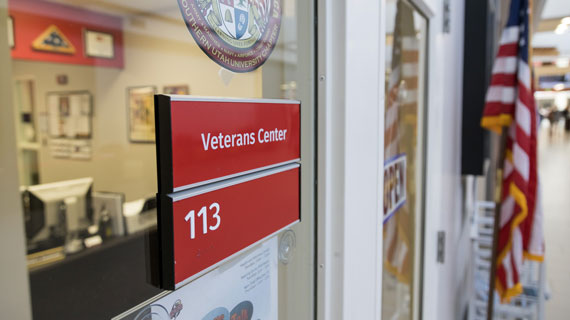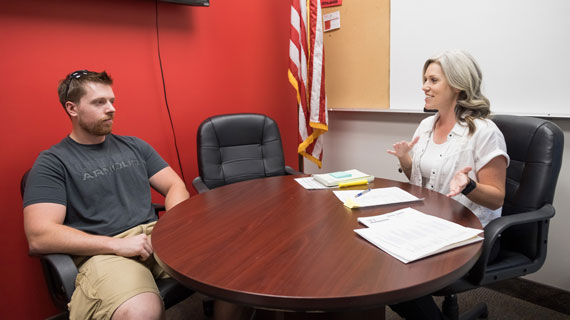How to Go Back to School as a Veteran
Posted: September 25, 2019 | Author: Tiago Rodrigues da Costa | Read Time: 4 minutes

Transitioning from the military to civilian life can be a challenging mission for many veterans. In particular for those who served in conflict areas, the memories and the emotions left behind can be hard to set aside in the classroom. However, life after the military exists and it’s important for veterans to attend college and thrive. When applying to Southern Utah University veteran students should consider the following:
Financial Aid Options
At SUU, veterans have the opportunity to receive not only financial aid but also in-state tuition.
“SUU gives veterans and military-connected students in-state tuition, which is really a big thing,” said Amanda Keller, director of the Veterans Resource and Support Center at SUU. “They are much more lenient on the residency requirements for veterans, and veterans don’t have to fulfill the years living in Cedar City in order to qualify for in-state tuition.”
Along with in-state tuition, there are financial aid options available to military-connected students. The Post 9/11 GI Bill® is a federally funded program aimed to cover three important aspects of student life: tuition and fees, housing, and books. At SUU, 100% of the annual value for tuition and fees are covered by the GI Bill® and students receive $1,227 per month for housing and $1,000 per year for books.
Besides the Post 9/11 GI Bill®, the Scholarships for Military Children Program awards $2,000 to children of veterans; the organization AMVETS (American Veterans) scholarship provides three veterans with $4,000 each year; the Veterans of Foreign Wars provides up to $5,000; and the American Legion together with Samsung grants up to $10,000 to a chosen veteran.
Additional financial aid options can be found on the Veterans Center website.
A Supportive Campus
“SUU feels extremely military-connected friendly to me,” said Keller. “We have the mentality of ‘let me walk with you’ instead of just ‘let me point the way’ and send you there. So, if a student has questions about financial aid, we will leave our office and walk with them to Financial Aid.”
As of Fall 2019, there are 519 veterans on campus, plus other military-connected students—these are military veterans or their children or spouse who receive the benefits of the transferred entitlement. Many of them come from out-of-state, from places like California and Texas.
It can be difficult for veterans to shift from being in the military to being in the civilian world, and as a result of that, SUU is expanding its Veterans Resource and Support Center with the purpose of being a foundation in veterans’ futures.
“We have a dedicated facility for veterans,” Keller said. “We have a director; we have the school certifying official. Our goal is to maintain good, open communication among all the departments and schools, in order to help veterans feel they are contributing members of society.”
Career Prospects
Although most veterans would come to college with a bigger life experience than most students coming from high school, they have one thing in common: The decision of coming to college and choosing a major isn’t an easy one. While SUU’s Aviation program is one of the most popular among veterans on campus, there are many options to choose from.
“When I got out of the Marine Corps I needed to focus on something different,” said Keller. “For me, it was important to come back to school because I knew that I wanted a better job than where I was before I went to the military.”
 Connections and Networking
Connections and Networking
While it might be easier to spend time with people who have similar interests, it’s important to take advantage of the university setting. The university is the place where people with different passions, and from different cultures, come together with the same goal: get an education, learn about life, share, and prepare to make a difference. Students and veterans alike should consider expanding their network while on campus.
“As a veteran, your life experience is a bonus on campus,” said Keller. “It’s hard for a great number of war veterans to share their dramatic stories with young students who never left home. However, there is a lot that both groups can learn with each other. It’s great if veterans open their hearts and share their emotional stories with young students, and it’s wonderful if young students can do the same. After all, dramatic stories don’t just necessarily happen in war zones. They can happen close to home.”
Child care
Finding childcare can be a challenge for parents when returning to school, however, the Non-Traditional Student Office on campus try in their best way to help parents find great solutions for their families. Check out the scholarships available.
For every decision veterans make, there are resources on campus to help make the best choice. Veterans are able to connect with previously graduated veterans, veterans who are currently at school, advisers at the Veterans Resource and Support Center, professors on campus, among others who work to create the best experience possible while attending SUU.
And never forget, going back to school should be about learning, experiencing and having fun. Get your coolest backpack and get ready to learn!
This article was published more than 3 years ago and might contain outdated information or broken links. As a result, its accuracy cannot be guaranteed.

